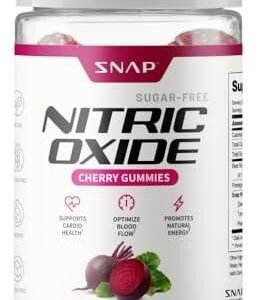In the realm of nutrition and physical performance, omega-3 fatty acids have emerged as pivotal players, garnering attention for their multifaceted health benefits. As the focus on holistic approaches to fitness intensifies, understanding the biochemical intricacies and physiological impacts of these essential fatty acids becomes increasingly relevant. Omega-3s, primarily found in fatty fish, flaxseeds, and walnuts, are renowned not only for their role in promoting cardiovascular health but also for their potential to enhance athletic performance and recovery. This article delves into the numerous ways omega-3 fatty acids contribute to fitness, exploring their anti-inflammatory properties, effects on muscle metabolism, and implications for endurance and strength training. By examining current research and expert insights, we aim to elucidate the critical importance of incorporating omega-3s into a well-rounded fitness regimen, ultimately providing a comprehensive perspective on their essential role in achieving and sustaining physical well-being.
Table of Contents
- The Physiological Role of Omega-3 Fatty Acids in Exercise Recovery
- Impact of Omega-3 Fatty Acids on Inflammation and Muscle Repair
- Optimizing Omega-3 Intake for Enhanced Athletic Performance
- Integrating Omega-3 Fatty Acids into a Balanced Diet for Fitness Enthusiasts
- In Conclusion
The Physiological Role of Omega-3 Fatty Acids in Exercise Recovery
Omega-3 fatty acids play a significant role in promoting effective recovery after exercise, acting through various physiological mechanisms that enhance muscle repair and reduce inflammation. These essential fats can be found abundantly in fish oil, flaxseed oil, and various nut oils, and their anti-inflammatory properties are crucial during the post-exercise phase. Regular consumption of Omega-3s post-workout may lead to improved muscle synthesis by:
- Inhibiting inflammatory cytokines: Omega-3s reduce the production of substances that contribute to muscle soreness and edema, leading to a quicker recovery time.
- Enhancing protein synthesis: These fatty acids activate signaling pathways that promote muscle protein synthesis, crucial for rebuilding muscle tissue strained during exercise.
Furthermore, Omega-3 fatty acids contribute to cardiovascular health, which is essential in sustaining endurance and overall fitness performance. The impact of Omega-3s extends to optimal nutrient delivery and oxygen transport, vital for recovery during intense physical activity. Key benefits include:
- Improved blood flow: Omega-3s can enhance endothelial function, leading to better circulation and nutrient delivery to repairing muscles.
- Reduced muscle soreness: Lowered levels of delayed onset muscle soreness (DOMS) can be experienced, allowing athletes to engage in training more consistently.
| Benefit | Mechanism |
|---|---|
| Enhanced Muscle Recovery | Reduces inflammation and promotes protein synthesis. |
| Improved Cardiovascular Function | Enhances blood flow and nutrient delivery. |
| Lowered Muscle Soreness | Decreases levels of DOMS, facilitating timely training. |
Impact of Omega-3 Fatty Acids on Inflammation and Muscle Repair
The relationship between omega-3 fatty acids and inflammation is well-documented in scientific literature. Omega-3s, particularly EPA (eicosapentaenoic acid) and DHA (docosahexaenoic acid), demonstrate powerful anti-inflammatory properties that can significantly influence recovery processes post-exercise. By modulating the production of pro-inflammatory cytokines and other signaling molecules, these essential fatty acids help reduce muscle soreness, enhance recovery times, and improve overall physical performance. Incorporating omega-3 sources, such as fatty fish, flaxseeds, and walnuts, into a fitness-focused diet may therefore play a crucial role in maintaining optimal muscle function and minimizing the risk of injury.
Furthermore, omega-3 fatty acids also promote muscle repair through mechanisms that enhance protein synthesis and reduce muscle catabolism. They may stimulate the release of growth factors that are vital for muscle regeneration. Studies have shown that regular intake of omega-3s can lead to improved muscle mass retention, particularly in older adults and those engaged in resistance training. This dual action of combating inflammation while supporting repair mechanisms positions omega-3 fatty acids as a strategic ally for anyone looking to optimize their fitness journey. To visualize these benefits, consider the following table highlighting key effects:
| Benefit | Description |
|---|---|
| Reduces Inflammation | Helps decrease muscle soreness and stiffness. |
| Supports Muscle Repair | Enhances protein synthesis and recovery post-exercise. |
| Prevention of Injury | Minimizes the risk of muscle-related injuries during training. |
Optimizing Omega-3 Intake for Enhanced Athletic Performance
Athletes can greatly benefit from optimizing their omega-3 intake, as these essential fatty acids play a critical role in various physiological processes. Research indicates that omega-3s contribute to improved muscle recovery, reduced inflammation, and enhanced overall cardiovascular health. By incorporating sources rich in omega-3s into their diet, athletes may experience improved joint health, which is crucial for maintaining peak performance during intense training and competition periods. High-quality sources of omega-3 fatty acids include:
- Fatty fish: Salmon, mackerel, sardines
- Plant-based options: Flaxseeds, chia seeds, walnuts
- Fish oil supplements: Concentrated sources for more targeted intake
Furthermore, omega-3s have been shown to enhance cognitive function, leading to better focus and reaction times during competitions. The synergistic effect of omega-3s may also support metabolic efficiency, allowing athletes to sustain energy levels throughout longer training sessions. A well-planned intake can be achieved through structured nutrition tables that track both dietary sources and supplementation.
| Omega-3 Source | Serving Size | Omega-3 Content (g) |
|---|---|---|
| Salmon | 3 oz | 1.5 |
| Flaxseeds | 1 tbsp | 2.4 |
| Walnuts | 1 oz | 2.5 |
| Sardines | 3.75 oz | 1.0 |
Integrating Omega-3 Fatty Acids into a Balanced Diet for Fitness Enthusiasts
Incorporating omega-3 fatty acids into a fitness-focused diet can significantly enhance physical performance and overall well-being. These essential fats are primarily found in sources such as fish, nuts, and seeds, and they play a crucial role in reducing inflammation, improving muscle recovery, and supporting cardiovascular health. For fitness enthusiasts, ensuring adequate omega-3 intake is vital, as it helps to:
- Promote heart health by lowering triglycerides and improving blood circulation.
- Support joint function, which is important for preventing injuries during workouts.
- Enhance cognitive function, aiding in focus and mental clarity during training sessions.
- Facilitate muscle recovery after intense exercise, reducing soreness and inflammation.
To effectively integrate omega-3 fatty acids into a balanced diet, fitness enthusiasts should consider including the following foods in their meal plans:
| Source | Omega-3 Content (per 100g) |
|---|---|
| Salmon | 2260mg |
| Chia Seeds | 17860mg |
| Walnuts | 6530mg |
| Flaxseeds | 22800mg |
By diversifying their diet to include these omega-3-rich foods, athletes can not only lay the groundwork for improved performance but also ensure their bodies are better equipped to handle the stresses of rigorous training. This holistic approach to nutrition, focused on the benefits of omega-3 fatty acids, reinforces the idea that what you eat is just as crucial as how you train.
In Conclusion
the exploration of omega-3 fatty acids reveals their indispensable role in enhancing fitness and overall well-being. The evidence supporting their benefits — from reducing inflammation and improving cardiovascular health to promoting cognitive function — is compelling. As we continue to advance our understanding of nutrition and its impact on physical performance, it becomes increasingly clear that omega-3s are not merely optional supplements but essential components of a holistic fitness regimen.
Athletes and fitness enthusiasts alike should consider incorporating omega-3-rich foods, such as fatty fish, flaxseeds, and walnuts, or high-quality supplements into their diets. Given their multifaceted benefits, omega-3 fatty acids represent a critical intersection of nutrition and performance, significantly contributing to an individual’s capacity for recovery, endurance, and mental focus.
As we move forward, further research will undoubtedly uncover additional insights into the mechanisms by which omega-3s affect physical performance, potentially guiding future dietary recommendations and interventions. Therefore, embracing these potent nutrients is not just a choice for enhanced fitness; it is a commitment to a more robust, healthier future.





